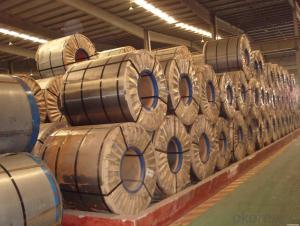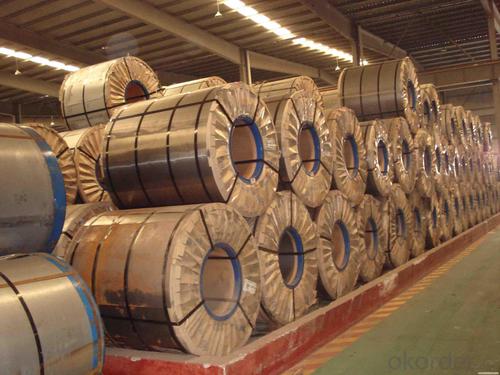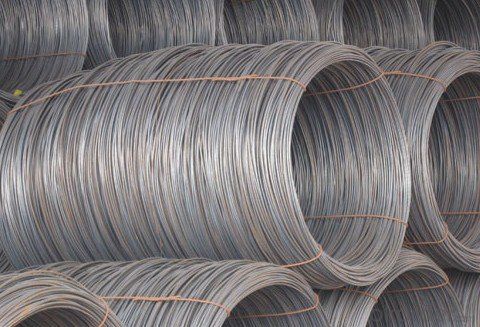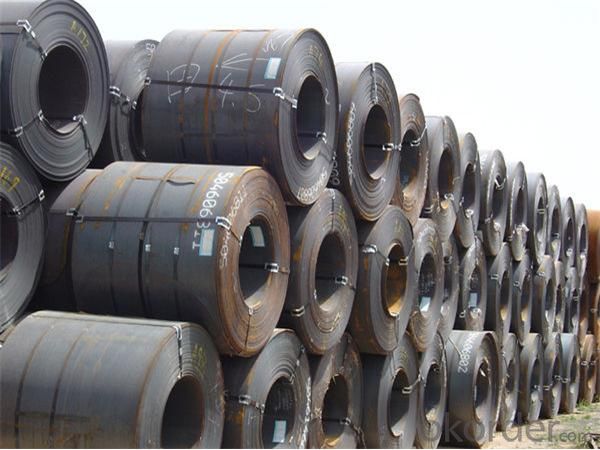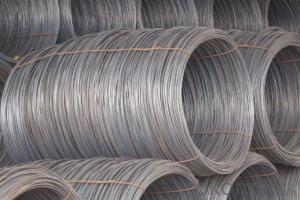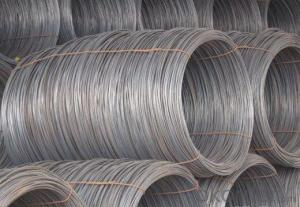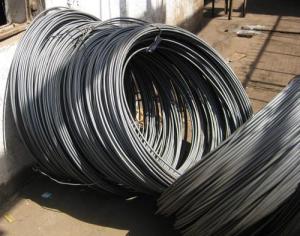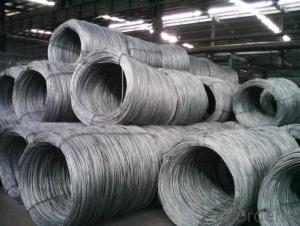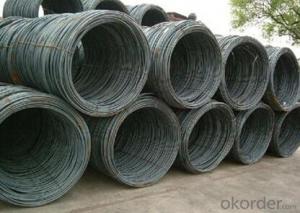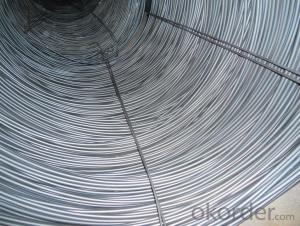Alloy Steel 8mm SAE 1010 Coils Steel Wire Rod
- Loading Port:
- China main port
- Payment Terms:
- TT OR LC
- Min Order Qty:
- 30 m.t.
- Supply Capability:
- 10000 m.t./month
OKorder Service Pledge
OKorder Financial Service
You Might Also Like
Specification
Product information:
Secifications
8mm SAE 1010b Coils Steel Wire Rod
other name: 5.5mm-12mm wire rod in coil
1.Grade: SAE 1006B,SAE 1008B,AISI 1050, AISI 1070
2.Diameter: 5.5mm-12mm
sae 1008 steel wire rod
Product | sae 1008 low carbon steel wire rod price steel wire rod carbon steel wire rod |
Standard | AISI, SAE,ASTM, BS, DIN, GB, JIS |
Steel grade | Q195,Q235,SAE1006B, SAE1008B, SAE1010B, SAE1018B, AISI 1010, AISI 1020, AISI 1050, AISI 1070 or according to customers requirements |
Material | Mild steel, iron, carbon, steel, ms |
Wire Gauge | 5.5mm,6.5mm,8mm,10mm,12mm-18mm, |
Technique | Hot rolled, Cold Drawn |
Coil weight | 1.8-2.1mts |
MOQ | 10MT |
Delivery Time | 15-30 days after receipt of L/C or deposit by T/T |
Packing | In coil and load in container, if large quantity, by bulk vessel; Can be packed as customers' special requirements |
Payment terms | 1).100% irrevocable L/C at sight. |
Application | widely used in machinery parts, manufacturing industry, electronics industry, metal tools and others |
Product Show:
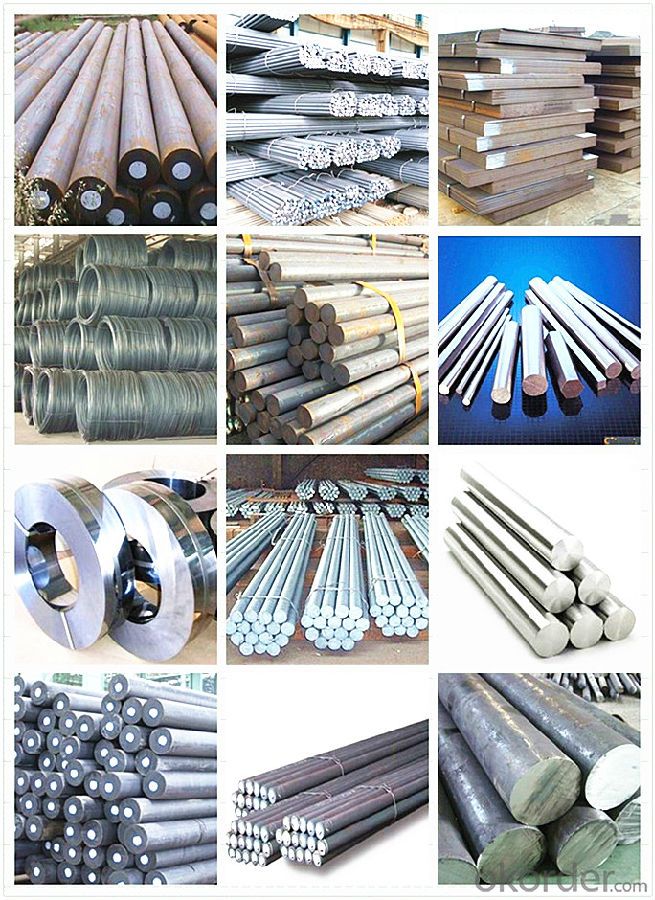
Workshop Show:
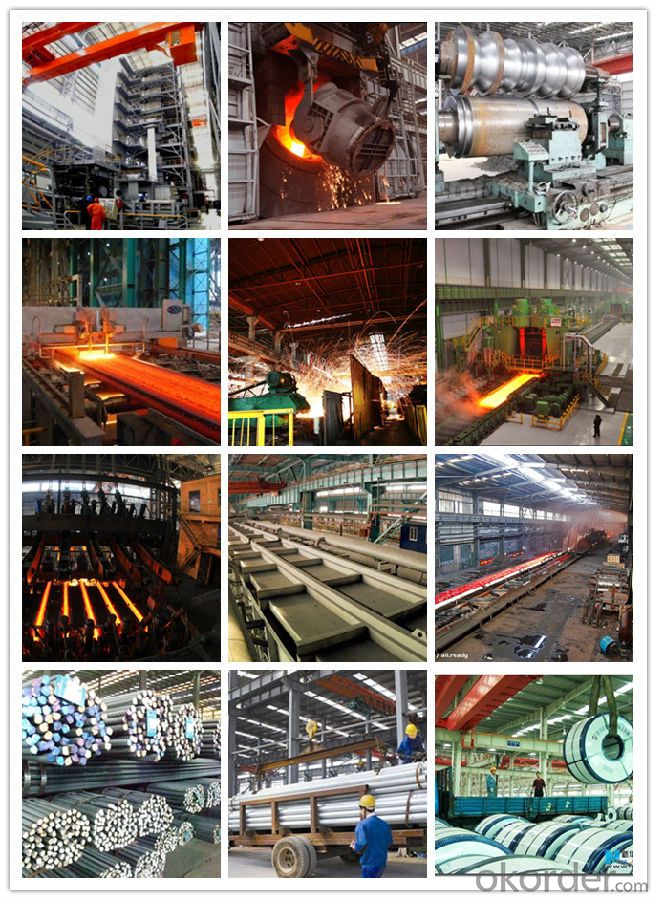
Shipping
1. FedEx/DHL/UPS/TNT for samples, Door-to-Door;
2. By Air or by Sea for batch goods, for FCL; Airport/ Port receiving;
3. Customers specifying freight forwarders or negotiable shipping methods!
Delivery Time: 3-7 days for samples; 5-25 days for batch goods.
Payment Terms
1.Payment: T/T, L/C, Western Union, MoneyGram,PayPal; 30% deposits; 70% balance before delivery.
2.MOQ: 1pcs
3.Warranty : 3 years
4.Package Informations: 1) EXPORT, In 20 feet (GW 25 ton) or 40 feet Container (GW 25 ton)
2)as customer's requirement
Why choose us?
(1) The leading exporter in China special steel industry.
(2) Large stocks for various sizes, fast delivery date.
(3) Good business relationship with China famous factories.
(4) More than 7 years steel exporting experience.
(5) Good after-sales service guarantee.
- Q: Can special steel be used in medical applications?
- Yes, special steel can be used in medical applications. Special steel, also known as stainless steel, is widely used in the medical field due to its unique properties and advantages. It is highly resistant to corrosion, which is essential in medical environments where contact with bodily fluids and sterilization processes are common. Additionally, special steel is biocompatible, meaning it does not cause adverse reactions when in contact with human tissues or fluids. This makes it suitable for applications such as surgical instruments, orthopedic implants, dental equipment, and medical devices. The versatility of special steel allows it to be shaped into various forms, ensuring it can be utilized for different medical purposes. Its strength and durability also contribute to its effectiveness in medical applications, providing long-lasting and reliable tools and equipment. Furthermore, special steel can withstand high temperatures, making it suitable for autoclaving and other sterilization methods. Overall, special steel's properties make it a highly suitable material for medical applications, ensuring the safety, efficacy, and durability of medical equipment and devices.
- Q: What are the different cutting tools used for special steel?
- For special steel applications, there exist various cutting tools commonly employed. These tools are specifically crafted to handle the distinct properties and characteristics of special steel, which often necessitate more precise and specialized cutting techniques. Some of the frequently used cutting tools for special steel include: 1. Saw blades with carbide tips: These blades possess carbide teeth, known for their exceptional hardness and durability. They effortlessly cut through special steel, providing clean and accurate cuts. 2. Cutting tools made of high-speed steel (HSS): HSS cutting tools are manufactured from a type of tool steel that can endure high temperatures while maintaining its hardness. These tools are commonly utilized for drilling, milling, and turning operations on special steel. 3. Cutting tools with diamonds: Diamonds are recognized as one of the hardest materials, making them ideal for cutting through tough materials like special steel. Diamond cutting tools, such as saw blades or grinding wheels coated with diamond, are commonly employed in special steel applications. 4. Machines utilizing waterjet cutting: Waterjet cutting machines utilize a high-pressure stream of water mixed with abrasive particles to cut through special steel. This method is particularly suitable for intricate designs and complex shapes. 5. Machines employing plasma cutting: Plasma cutting machines employ a high-velocity jet of ionized gas to cut through special steel. This method is frequently used for rapidly and efficiently cutting thick sections of special steel. 6. Machines utilizing laser cutting: Laser cutting machines employ a highly focused laser beam to cut through special steel. This method offers high precision and can be utilized for cutting complex shapes and patterns. To ensure the best cutting tool is selected for the job, it is crucial to choose the appropriate cutting tool based on the specific requirements of the special steel in question, as well as the desired cutting method and application. Seeking advice from a specialist or referring to the manufacturer's recommendations can help guarantee the optimal cutting tool is chosen.
- Q: What are the common challenges in welding titanium alloys?
- Welding titanium alloys presents various difficulties due to the unique properties of titanium. Firstly, the melting point of titanium is exceptionally high, reaching approximately 1668°C (3034°F). This necessitates the use of specialized equipment and techniques to attain optimal welding conditions. Moreover, this high melting point increases the risk of overheating, which can lead to distortion or warping of the welded components. Another challenge lies in titanium's strong reactivity with oxygen, nitrogen, and hydrogen. These gases can easily contaminate the weld pool during the welding process, resulting in the formation of brittle and porous welds. Therefore, it is essential to take rigorous measures such as utilizing inert shielding gases like argon or helium, maintaining a high level of cleanliness, and employing proper welding techniques like gas tungsten arc welding (GTAW) to minimize contamination and achieve sound welds. Titanium also exhibits a significant affinity for carbon, which can cause the formation of brittle intermetallic compounds during welding. To prevent this, it is crucial to employ low-carbon filler metals and ensure appropriate heat input to avoid carbon diffusion into the weld zone. Furthermore, titanium alloys possess low thermal conductivity, causing heat generated during welding to concentrate in a small area. This concentration leads to localized overheating and potential damage. Hence, it is vital to control heat input and utilize suitable welding techniques to distribute heat evenly, thereby avoiding overheating and preserving the integrity of the welded joint. Lastly, titanium alloys display a high coefficient of thermal expansion, resulting in significant thermal expansion and contraction throughout the welding process. This can lead to distortion and residual stresses in the welded components. To mitigate these issues, preheating and post-weld heat treatment may be required to minimize distortion and relieve residual stresses. In conclusion, the challenges in welding titanium alloys encompass a high melting point, reactivity with gases, potential contamination, formation of intermetallic compounds, low thermal conductivity, and significant thermal expansion. By comprehending these challenges and implementing suitable welding techniques, it is possible to overcome these difficulties and achieve high-quality welds in titanium alloys.
- Q: How does special steel perform in terms of creep resistance at elevated temperatures?
- Special steel has excellent creep resistance at elevated temperatures. Its unique composition and heat treatment processes enable it to maintain its strength and dimensional stability over prolonged periods of exposure to high temperatures. This makes special steel highly reliable and suitable for applications where resistance to creep deformation is crucial, such as in power generation plants, aerospace, and oil and gas industries.
- Q: How does special steel enhance the durability of products?
- Special steel enhances the durability of products by providing superior strength, hardness, and resistance to wear, corrosion, and extreme temperatures. Its unique composition and manufacturing techniques make it highly efficient in withstanding heavy loads and external factors, thereby ensuring longevity and reliability of the products it is used in.
- Q: How does special steel perform in hydrogen embrittlement conditions?
- Special steel, known by other names like high-strength steel or alloy steel, possesses remarkable resistance to conditions that cause hydrogen embrittlement. Hydrogen embrittlement occurs when hydrogen atoms infiltrate the metallic lattice structure, causing it to become brittle and prone to fractures when subjected to stress. Given their distinct composition and microstructure, special steels are engineered to endure harsh environments, including those susceptible to hydrogen embrittlement. These steels often contain alloying elements such as nickel, chromium, and molybdenum, which enhance their ability to withstand cracking induced by hydrogen. The presence of these alloying elements in special steel facilitates the development of protective oxide layers on the steel's surface. These layers act as a barrier, preventing hydrogen atoms from diffusing into the metal matrix. Moreover, these elements can capture and bind hydrogen atoms, reducing their mobility and minimizing their negative impact on the steel's mechanical properties. Furthermore, special steels frequently undergo diverse heat treatments and processing techniques, like quenching and tempering, to further enhance their resistance to hydrogen embrittlement. These processes refine the steel's microstructure, enhancing its strength, toughness, and ductility while minimizing the risk of hydrogen-induced cracking. In general, special steel outperforms standard steels in hydrogen embrittlement conditions. Its unique composition, microstructure, and processing techniques make it highly resilient to the detrimental effects of hydrogen atoms. As a result, special steel ensures the structural integrity and reliability of components and structures operating in hydrogen-rich environments.
- Q: What are the main applications of special steel in the power generation sector?
- Special steel is extensively used in the power generation sector for various critical applications. Some of the main applications include turbine blades, rotors, and casings, which require high strength, heat resistance, and corrosion resistance. Additionally, special steel is used in the construction of power plant boilers, pressure vessels, and piping systems, ensuring efficient operation and long-term durability. Furthermore, it finds application in the manufacturing of electrical components such as generators, transformers, and transmission lines, where its superior electrical conductivity and magnetic properties are crucial. Overall, special steel plays a vital role in enhancing the performance, reliability, and safety of power generation equipment and infrastructure.
- Q: Can special steel be used in the food packaging industry?
- Yes, special steel can be used in the food packaging industry. Special steel alloys, such as stainless steel, are commonly used in food packaging due to their corrosion resistance, durability, and ability to maintain product integrity. These properties make special steel suitable for applications where hygiene, safety, and longevity are essential, making it an ideal choice for various food packaging materials and equipment.
- Q: What is the impact of impurities on the properties of special steel?
- Impurities in special steel can have a significant impact on its properties. These impurities can affect the steel's strength, toughness, corrosion resistance, and overall performance. For instance, excessive levels of impurities like sulfur and phosphorus can reduce the steel's ductility and make it more prone to cracking. Similarly, high amounts of carbon impurities can affect the steel's hardness and make it more brittle. Therefore, controlling and minimizing impurities is crucial in ensuring that special steel meets the desired quality and performance requirements.
- Q: How does special steel contribute to the manufacturing aftermarket industry?
- Special steel plays a significant role in the manufacturing aftermarket industry by offering enhanced performance, durability, and reliability in the production of various components and equipment. One of the key contributions of special steel is its ability to withstand extreme conditions, such as high temperatures, corrosive environments, or heavy loads. This makes it an ideal material for manufacturing critical parts used in industries like automotive, aerospace, energy, and machinery. In the manufacturing aftermarket industry, special steel is commonly used in the production of replacement parts for machinery or equipment that have become worn out or damaged over time. The use of special steel ensures that these replacement parts possess the necessary strength and resilience to meet the original equipment manufacturer (OEM) specifications. Furthermore, special steel allows for the development of innovative designs and the production of more efficient and lightweight components. This helps in improving the overall performance of the equipment, reducing energy consumption, and enhancing productivity. For example, in the automotive industry, special steel is used to manufacture lightweight engine components, resulting in improved fuel efficiency and reduced emissions. Moreover, the use of special steel in the manufacturing aftermarket industry contributes to the reduction of maintenance and downtime costs. By using high-quality steel, the longevity of the replacement parts is increased, reducing the frequency of repairs or replacements. This leads to a decrease in production downtime and associated costs, as well as improving the overall reliability of the equipment. Additionally, special steel offers a wide range of customization options, enabling manufacturers to tailor the material properties to specific requirements. This flexibility allows for the development of unique solutions and the production of specialized components that meet the demands of various industries. It also enables manufacturers to address specific challenges related to wear resistance, hardness, or toughness, which are crucial factors in the aftermarket industry. In conclusion, special steel contributes significantly to the manufacturing aftermarket industry by providing enhanced performance, durability, and reliability to replacement parts. Its ability to withstand extreme conditions, enable innovative designs, reduce maintenance costs, and offer customization options makes it an indispensable material in the production of components and equipment in various industries.
Send your message to us
Alloy Steel 8mm SAE 1010 Coils Steel Wire Rod
- Loading Port:
- China main port
- Payment Terms:
- TT OR LC
- Min Order Qty:
- 30 m.t.
- Supply Capability:
- 10000 m.t./month
OKorder Service Pledge
OKorder Financial Service
Similar products
Hot products
Hot Searches
Related keywords
